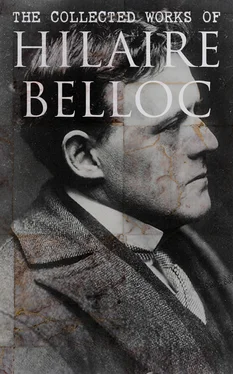Of these three conceptions, had the first been as true as the last, it would have saved the Constitution of the Clergy and the reputation for common-sense of those who framed it.
It was certainly true that Catholicism had for so many centuries been bound up in the framework of the State that the Parliament must therefore do something with the Church in the general settlement of the nation: it could not merely leave the Church on one side.
It was also superficially true that the Church was a power to be reckoned with politically, quite apart from the traditional union of Church and State—but only superficially true. What the revolutionary politicians feared was the intrigue of those who commanded the organisation of the Catholic Church, men whom they knew for the most part to be without religion, and the sincerity of all of whom they naturally doubted. A less superficial and a more solid judgment of the matter would have discovered that the real danger lay in the animosity or intrigue against the Civil Constitution, not of the corrupt hierarchy, but of the sincere though ill-instructed and dwindling minority which was still loyally attached to the doctrines and discipline of the Church. But even this superficial judgment would not have been fatal, had not the judgment of the National Assembly been actually erroneous upon the first point—the vitality of the Faith.
Had the Catholic Church been, as nearly all educated men then imagined, a moribund superstition, had the phase of decline through which it was passing been a phase comparable to that through which other religions have passed in their last moments, had it been supported by ancient families from mere tradition, clung to by remote peasants from mere ignorance and isolation, abandoned (as it was) in the towns simply because the towns had better opportunities of intellectual enlightenment and of acquiring elementary knowledge in history and the sciences; had, in a word, the imaginary picture which these men drew in their minds of the Catholic Church and its fortunes been an exact one, then the Civil Constitution of the Clergy would have been a statesmanlike act. It would have permitted the hold of the Catholic Church upon such districts as it still retained to vanish slowly and without shock. It proposed to keep alive at a reasonable salary the ministers of a ritual which would presumably have lost all vitality before the last of its pensioners was dead; it would have prepared a bed, as it were, upon which the last of Catholicism in Gaul could peacefully pass away. The action of the politicians in framing the Constitution would have seemed more generous with every passing decade and their wisdom in avoiding offence to the few who still remained faithful, would have been increasingly applauded.
On the other hand, and from the point of view of the statesman, the Civil Constitution of the Clergy bound strictly to the State and made responsible to it those ancient functions, not yet dead, of the episcopacy and all its train. It was a wise and a just consideration on the part of the Assembly that religions retain their machinery long after they are dead, and if that machinery has ever been a State machinery it must remain subject to the control of the State: and subject not only up to the moment when the living force which once animated it is fled, but much longer; up, indeed, to the moment when the surviving institutions of the dead religion break down and perish.
So argued the National Assembly and its committee, and, I repeat, the argument was just and statesmanlike, prudent and full of foresight, save for one miscalculation. The Catholic Church was not dead, and was not even dying. It was exhibiting many of the symptoms which in other organisms and institutions correspond to the approach of death, but the Catholic Church is an organism and an institution quite unlike any other. It fructifies and expands immediately under the touch of a lethal weapon; it has at its very roots the conception that material prosperity is stifling to it, poverty and misfortune nutritious.
The men of the National Assembly would have acted more wisely had they closely studied the story of Ireland (then but little known), or had they even made themselves acquainted with the methods by which the Catholic Church in Britain, after passing in the fifteenth century through a phase somewhat similar to that under which it was sinking in Gaul in the eighteenth, was stifled under Henry and Elizabeth.
But the desire of the men of 1789 was not to kill the Church but to let it die; they thought it dying. Their desire was only to make that death decent and of no hurt to the nation, and to control the political action of a hierarchy that had been wealthy and was bound up with the old society that was crumbling upon every side.
The Civil Constitution of the Clergy failed: it lit the civil war, it dug the pit which divided Catholicism from the Revolution at the moment of the foreign invasion, it segregated the loyal priest in such a fashion that his order could not but appear to the populace as an order of traitors, and it led, in the furnace of 1793, to the great persecution from the memories of which the relations between the French democracy and the Church have not recovered.
It is important to trace the actual steps of the failure; for when we appreciate what the dates were, how short the time which was left for judgment or for revision, and how immediately disaster followed upon error, we can understand what followed and we can understand it in no other way.
If we find an enduring quarrel between two families whose cause of contention we cannot seize and whose mutual hostility we find unreasonable, to learn that it proceeded from a cataclysm too rapid and too violent for either to have exercised judgment upon it will enable us to excuse or at least to comprehend the endurance of their antagonism. Now, it was a cataclysm which fell upon the relations of the Church and State immediately after the error which the Parliament had committed; a cataclysm quite out of proportion to their intentions, as indeed are most sudden disasters quite out of proportion to the forces that bring them about.
It was, as we have seen, in the summer of 1790—upon the 12th of July—that the Civil Constitution of the Clergy was approved by the Assembly. But it was not until the 26th of August that the King consented to sign. Nor was there at the moment any attempt to give the law effect. The protests of the bishops, for instance, came out quite at leisure, in the month of October, and the active principle of the whole of the Civil Constitution—to wit, the presentation of the Civic Oath which the clergy were required to take, was not even debated until the end of the year.
This Civic Oath, which is sometimes used as a bugbear in the matter, was no more than an engagement under the sanction of an oath that the bishop or priest taking it would maintain the new régime —though that régime included the constitution of the clergy; the oath involved no direct breach with Catholic doctrine or practice. It was, indeed, a folly to impose it, and it was a folly based upon the ignorance of the politicians (and of many of the bishops of the day) as to the nature of the Catholic Church. But the oath was not, nor was it intended to be, a measure of persecution. Many of the parish clergy took it, and most of them probably took it in good faith: nor did it discredit the oath with the public that it was refused by all save four of the acting bishops, for the condition of the hierarchy in pre-revolutionary France was notorious. The action of the bishops appeared in the public eye to be purely political, and the ready acceptance of the oath by so many, though a minority, of the lower clergy argued strongly in its favour.
Nevertheless, no Catholic priest or bishop or layman could take that oath without landing himself in disloyalty to his religion; and that for the same reason which led St. Thomas of Canterbury to make his curious and fruitful stand against the reasonable and inevitable, as much as against the unreasonable, governmental provisions of his time. The Catholic Church is an institution of necessity autonomous. It cannot admit the right of any other power exterior to its own organisation to impose upon it a modification of its discipline, nor, above all, a new conception of its hieratic organisation.
Читать дальше












